Alumna Nikita Karim propelled her curiosity about technology into a stellar computing career that supports women in STEM
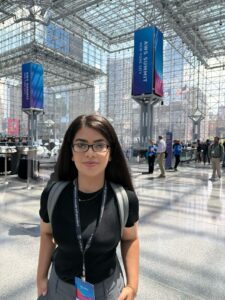
Nikita Karim attended the 2025 Amazon Web Services (AWS) Summit in New York City, where she explored the latest in agentic AI, including Model Context Protocol (MCP) and Amazon Bedrock.
As a Muslim-American Bangladeshi student attending Danbury Public Schools, Nikita Karim knew that she loved math and was fascinated by technology. She saw a colorful array of the first-generation iMac G3 desktops donated to her elementary school library, and knew that Apple was going to revolutionize computing. Karim also saw the rise of social media platforms and the web, and found their influence on society fascinating.
As a result, Karim took computer science classes in high school, and quickly discovered she was one of only two girls in her programming class. Undaunted, she pursued Visual Basic and AP Java, and “valued every opportunity to engage directly with technology.”
While in high school, Karim also participated in Western Connecticut State University’s ConnCAP/Upward Bound program, which allowed her to spend time during the summer on WCSU’s campus, learning about the Admissions and Financial Aid processes, and taking college-level courses. It was there she met Dr. Jessica Coronel, who at the time was an administrator with the program, and is now the Assistant Dean of the university’s School of Graduate, International and Career Studies. Karim said Coronel has been her “rock,” providing steady support and guidance throughout her graduate studies in Artificial Intelligence at WCSU, where she is currently a Graduate Research Fellow.
Once on campus, Karim found herself once again as one of only two women pursuing a Bachelor of Science in Computer Science degree. According to U.S. Bureau of Labor Statistics, Karim noted, only about 17 percent of women in the U.S. earn a bachelor’s degree in Computer Science.
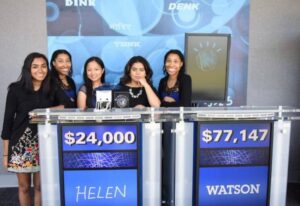
First-place winners of the IBM Research BlueHack at the Thomas J. Watson Research Center. Nikita S. Karim (second from right) and her teammates stand with their TJBot in front of the iconic IBM Watson Jeopardy!
While working toward her B.S. in Computer Science at WCSU, Karim began her career as a Software Engineer Co-Op at IBM Research’s Thomas J. Watson Research Center for Emerging Technologies and Solutions. There, she led a team to first place in the first 72-hour virtual BlueHack competition, which brought together 77 teams from 20 IBM sites across the United States to compete in four categories. Karim’s project combined IoT-based speech-to-text and video recognition, powered by Watson services on IBM Cloud, to enable real-time interpretation of American Sign Language (ASL). The robot, built on IBM’s TJBot, was designed with CAD-modeled, 3D-printed carbon fiber components and controlled by a Raspberry Pi managing Watson services, motor controllers, and sensor inputs for responsive gesture translation. The team drew inspiration from Helen Keller, whose life’s work showed how barriers in communication can be overcome with perseverance, creativity, and innovation. Her story motivated the design of a system that empowers accessibility, ensuring technology can serve as a bridge for individuals facing challenges in speech and hearing.
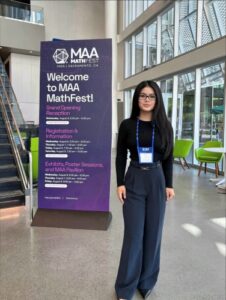
Nikita Karim attending the 2025 MAA MathFest in California, supported through scholarships from WCSU CSI, SGA, and the Tao Scholarship Program for her work in Artificial Intelligence.
Karim later joined IBM Consulting as a Senior Automation Engineer, specializing in software development, test automation, and CI/CD pipelines for enterprise and financial applications, earning the IBM Service Excellence Award and Manager’s Choice Award. She also received the 2025 Mathematical Association of America (MAA) Student Scholar Award, the D.E. Shaw Student Grant and the WCSU Tao Endowed Scholarship for Peace. Karim presented at the 2025 MAA MathFest Conference on an agentic AI framework for breast cancer detection, applying wavelet-enhanced multi-view learning, spatial transcriptomics, and matrix factorization to improve subtype classification and clinical decision support.
She actively mentors future STEM leaders through her roles as a STEM Research Mentor at WCSU, a Software Engineer Mentor for IBM Research’s GirlsGoTechKnow, and a volunteer with the Society of Women Engineers THINKSteam, Black Girls Code, and Girls Who Code.
Karim said one reason she has already accomplished this much is because of the support — and scholarships — she received while at WCSU. “The faculty support from Professor of Mathematics Dr. Xiaodi Wang and Computer Science Department Chair Dr. Daniel Coffman, and scholarships received from WCSU’s Center for Student Involvement, Student Government Association, The Tao Endowed Scholarship for Peace from the WCSU Foundation, and the Mathematical Association of America made a huge difference,” she said.
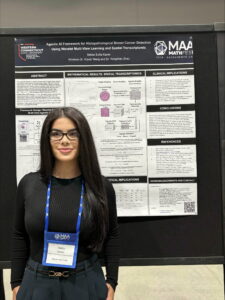
Nikita Karim presenting her research on an Agentic AI Framework for Breast Cancer Detection at the 2025 Mathematical Association of America (MAA) MathFest, where she received the Student Scholar Award from the national MAA Board through the D.E. Shaw Student Grant.
“As a student, I also worked in the university’s Information Technology and Innovation Department, which gave me the opportunity to build by resume and gain experience while also giving me exposure to how an IT department works in terms of architecture and the skill set a similar department would be looking for. It also allowed me the opportunity to participate on WCSU’s Women’s Tennis Team, as vice president of the Math Club, and as a member of the Muslim Student Association. Karim also pursued studies abroad in Florence, Italy, where she immersed herself in the language and culture while completing her language requirement in Italian. She later broadened her academic perspective in Sofia, Bulgaria, where she worked with Roma children at an orphanage, introducing Raspberry Pi devices to their classrooms and completing a research paper on how limited access to technology can impede educational development and opportunities, an experience that fulfilled her writing intensive credit.
As in high school, Karim once again found herself to be one of only two females in her computer science classes, so she began seeking talks, panels, and TED Talks — anything that could reassure her that she was pursuing the right field. She was later invited by her IBM mentor, Rebecca Fanning, to attend a Girls Who Code event held in honor of Nicholas Donofrio, a renowned scientist and IBM Fellow known as the man who ‘saved’ the mainframe computer, who donated $50,000 to support the organization and advance opportunities for young women in technology. It was at this event, during a panel where Fanning was also speaking, that she met Radha Ratnaparkhi, Vice President at IBM Research.
“Radha was kind to make the time and speak with me,” Karim said. “We discussed cloud technology, IBM’s Jeopardy achievement, and mathematics. That conversation expanded my limited perspective and revealed the vast possibilities within my reach. I did not yet grasp the impact it would have, but that moment became a turning point that shaped the trajectory of my professional and academic career.”
WCSU Computer Science Department Chair Dr. Daniel Coffman, himself a former engineer at IBM Research, not only encouraged her pursuit of the internship, but also made sure Karim received academic credit toward her Computer Science degree. “He gave me support and encouragement while I was at IBM Research and throughout my career, and that support has remained a constant in my academic journey,” Karim said.
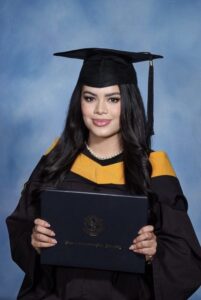
Nikita Sufia Karim, Graduate Research Fellow and M.S. Candidate in Artificial Intelligence, holding her B.S. in Computer Science from Western Connecticut State University.
Now she will continue her studies as a post-grad with WCSU’s Artificial Intelligence Graduate Coordinator, Coffman, as a Graduate Research Fellow under her faculty adviser, Dr. Xiaodi Wang. “The Master of Science in Artificial Intelligence program has allowed me to continue my passion for discrete mathematics, multivariable mathematics, and machine learning, while strengthening the skills essential for pursuing applied research.” She expects to receive her Master of Science in Artificial Intelligence in 2026 and is excited about her future career working on innovative technologies in the AI space.
It’s an immeasurable leap for the first-generation student who had to rely on the Danbury Public Library for access to a computer and technology, and it’s a top priority for Karim to mentor younger students — especially girls who are interested in STEM — to reach for their goals.
The message she wants to send to those who are following behind her at Danbury High School is: “My father, Abu Nassir Helalul Karim, immigrated to the United States from Bangladesh over 34 years ago with the dream of giving his family a better life and ensuring that his daughter, and the generations of women after her, would have access to education and financial independence. In the same way my father set this tone for me, I encourage others to strive for greater opportunities: pursue higher education, set the example you want to see in the world, take space, and never hesitate to walk into rooms where you may be the only one who looks like you. Travel, explore new cultures, build your network, and embrace the discomfort that comes with growth. What makes you different is your strength, so lean into it and let it carry you forward.”
Western Connecticut State University changes lives by providing all students with a high-quality education that fosters their growth as individuals, scholars, professionals, and leaders in a global society. Our vision: To be widely recognized as a premier public university with outstanding teachers and scholars who prepare students to contribute to the world in a meaningful way.

